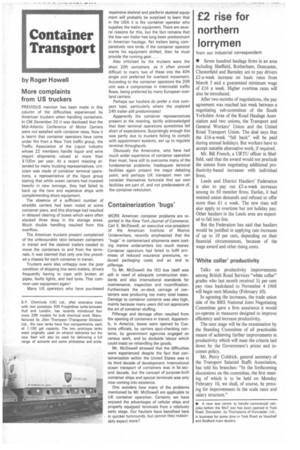£2 rise for northern lorrymen
Page 40

If you've noticed an error in this article please click here to report it so we can fix it.
from our industrial correspondent • Seven hundred haulage firms in an area including Sheffield, Rotherham, Doncaster, Chesterfield and Barnsley are to pay drivers £2-a-week increase on basic rates from March 3 and a guaranteed minimum wage of £16 a week. Higher overtime rates will also be introduced.
After two-months of negotiations, the pay agreement was reached last week between a negotiating sub-committee of the South Yorkshire Area of the Road Haulage Association and two unions, the Transport and General Workers' Union and the United Road Transport Union. The deal says that the £16-a-week "fall back" will be paid during annual holidays. But workers have to accept suitable alternative work, if required.
Mr. Bill French, a URTU officer in Sheffield, said that the award would not preclude the unions from negotiating additional productivity-based increases with individual firms.
Leeds and District Hauliers' Federation is also to pay out £2-a-week increases among its 50 member firms. Earlier, it had resisted union demands and refused to offer more than £1 a week. The new rises will also apply to overtime but not holiday pay. Other hauliers in the Leeds area are expected to fall into line.
But the Federation has said that hauliers would be justified in applying rate increases of up to 10 per cent, depending on their financial circumstances, because of the wage award and other rising costs.
'White collar' productivity Talks on productivity improvements among British Road Services "white collar" grades who last month received 3+ per cent pay rises backdated to November 4 1968 will begin next Monday (February It)).
In agreeing the increases, the trade union side of the BRS National Joint Negotiating Committee gave a firm assurance it would co-operate in measures designed to improve efficiency and increase productivity.
The next stage will be the examination by the Standing Committee of all practicable means of achieving further improvements in productivity which will meet the criteria laid down by the Government's prices and incomes policy.
Mr. Percy Coldrick, general secretary of the Transport Salaried Staffs Association, has told his branches: "In the forthcoming discussions on the committee, the first meeting of which is to be held on Monday February 10, we shall, of course, be pressing for improvements in the scale rates and salary structure."












































































































































































